 Libri di Elizabeth Grosz su Unilibro.it
)
Libri di Elizabeth Grosz su Unilibro.it
)
|
|
1918 |
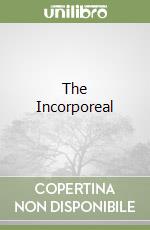 Title :
The Incorporeal
Title :
The IncorporealAuthor: Grosz Elizabeth Publisher: Columbia Univ Pr € 26,60
|
|
|
1917 |
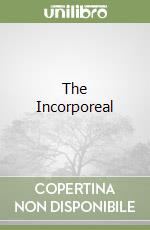 Title :
The Incorporeal
Title :
The IncorporealAuthor: Grosz Elizabeth Publisher: Columbia Univ Pr € 39,30
|
|
|
1911 |
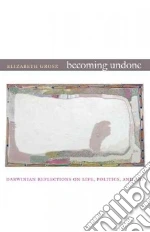 Title :
Becoming Undone
Title :
Becoming UndoneAuthor: Grosz Elizabeth Publisher: Duke Univ Pr In Becoming Undone, Elizabeth Grosz addresses three related concepts—life, politics, and art—by exploring the implications of Charles Darwin's account of the evolution of species. Challenging characterizations of Darwin's work as a form of genetic determinism, Grosz shows that his writing reveals an insistence on the difference between natural selection and sexual selection, the principles that regulate survival and attractiveness, respectively. Sexual selection complicates natural selection by introducing aesthetic factors and the expression of individual will, desire, or pleasure. Grosz explores how Darwin's theory of sexual selection transforms philosophy, our understanding of humanity in its male and female forms, our ideas of political relations, and our concepts of art. Connecting the naturalist's work to the writings of Bergson, Deleuze, and Irigaray, she outlines a postmodern Darwinism that understands all of life as forms of competing and coordinating modes of openness. Although feminists have been suspicious of the concepts of nature and biology central to Darwin's work, Grosz proposes that his writings are a rich resource for developing a more politicized, radical, and far-reaching feminist understanding of matter, nature, biology, time, and becoming. € 25,20
|
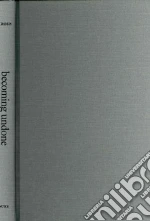 Title :
Becoming Undone
Title :
Becoming UndoneAuthor: Grosz Elizabeth Publisher: Duke Univ Pr In Becoming Undone, Elizabeth Grosz addresses three related concepts—life, politics, and art—by exploring the implications of Charles Darwin's account of the evolution of species. Challenging characterizations of Darwin's work as a form of genetic determinism, Grosz shows that his writing reveals an insistence on the difference between natural selection and sexual selection, the principles that regulate survival and attractiveness, respectively. Sexual selection complicates natural selection by introducing aesthetic factors and the expression of individual will, desire, or pleasure. Grosz explores how Darwin's theory of sexual selection transforms philosophy, our understanding of humanity in its male and female forms, our ideas of political relations, and our concepts of art. Connecting the naturalist's work to the writings of Bergson, Deleuze, and Irigaray, she outlines a postmodern Darwinism that understands all of life as forms of competing and coordinating modes of openness. Although feminists have been suspicious of the concepts of nature and biology central to Darwin's work, Grosz proposes that his writings are a rich resource for developing a more politicized, radical, and far-reaching feminist understanding of matter, nature, biology, time, and becoming. € 94,60
|
|
2011 |
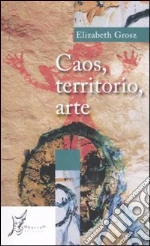 Title :
Caos, territorio, arte
Title :
Caos, territorio, arteAuthor: Grosz Elizabeth Publisher: O Barra O Edizioni Quali sono le 'origini' dell'arte? Le condizioni ontologiche del suo emergere, del suo manifestarsi a partire dal caos, dal turbinante movimento di forze eccedenti e non funzionali. Come agisce l'arte su di noi? Elizabeth Grosz delinea un percorso di ricerca che si spinge al di là della pura dimensione estetica. Intrecciando in modo originale la logica della sensazione di Deleuze, le teorie sulla selezione sessuale di Darwin e il concetto di ambiente di von Uexkùll, l'autrice indaga le relazioni che architettura, musica e pittura -le arti in genere - instaurano tra corpo, forze universali del caos e creazione di futuri possibili (forse) ancora non pensati. L'esperienza artistica è qui concepita come motore del divenire, come processo evolutivo che, agendo direttamente sul sistema nervoso degli esseri viventi, genera mondi, territori e forme altre di esistenza. € 14,00
Scontato: € 13,30
|
|
|
2008 |
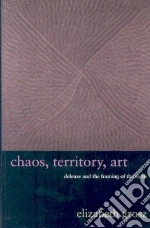 Title :
Chaos, Territory, Art
Title :
Chaos, Territory, ArtAuthor: Grosz Elizabeth Publisher: Columbia Univ Pr Instead of treating art as a unique creation that requires reason and refined taste to appreciate, Elizabeth Grosz argues that art-especially architecture, music, and painting-is born from the disruptive forces of sexual selection. She approaches art as a form of erotic expression connecting sensory richness with primal desire, and in doing so, finds that the meaning of art comes from the intensities and sensations it inspires, not just its intention and aesthetic. By regarding our most cultured human accomplishments as the result of the excessive, nonfunctional forces of sexual attraction and seduction, Grosz encourages us to see art as a kind of bodily enhancement or mode of sensation enabling living bodies to experience and transform the universe. Art can be understood as a way for bodies to augment themselves and their capacity for perception and affection-a way to grow and evolve through sensation. Through this framework, which knits together the theories of Charles Darwin, Henri Bergson, Gilles Deleuze, Félix Guattari, and Jakob von Uexküll, we are able to grasp art's deep animal lineage. Grosz argues that art is not tied to the predictable and known but to new futures not contained in the present. Its animal affiliations ensure that art is intensely political and charged with the creation of new worlds and new forms of living. According to Grosz, art is the way in which life experiments with materiality, or nature, in order to bring about change. € 27,60
|
|
|
2005 |
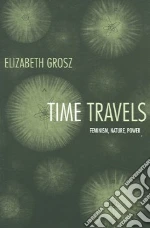 Title :
Time Travels
Title :
Time TravelsAuthor: Grosz Elizabeth Publisher: Duke Univ Pr Recently the distinguished feminist theorist Elizabeth Grosz has turned her critical acumen toward rethinking time and duration. Time Travels brings her trailblazing essays together to show how reconceptualizing temporality transforms and revitalizes key scholarly and political projects. In these essays, Grosz demonstrates how imagining different relations between the past, present, and future alters understandings of social and scientific projects ranging from theories of justice to evolutionary biology, and she explores the radical implications of the reordering of these projects for feminist, queer, and critical race theories. Grosz's reflections on how rethinking time might generate new understandings of nature, culture, subjectivity, and politics are wide ranging. She moves from a compelling argument that Charles Darwin's notion of biological and cultural evolution can potentially benefit feminist, queer, and antiracist agendas to an exploration of modern jurisprudence's reliance on the notion that justice is only immanent in the future and thus is always beyond reach. She examines Henri Bergson's philosophy of duration in light of the writings of Gilles Deleuze, Maurice Merleau-Ponty, and William James, and she discusses issues of sexual difference, identity, pleasure, and desire in relation to the thought of Deleuze, Friedrich Nietzsche, Michel Foucault, and Luce Irigaray. Together these essays demonstrate the broad scope and applicability of Grosz's thinking about time as an undertheorized but uniquely productive force. € 25,20
|
|
|
2001 |
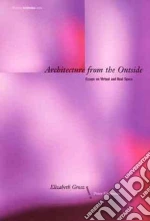 Title :
Architecture from the Outside
Title :
Architecture from the OutsideAuthor: Grosz Elizabeth, Eisenman Peter (FRW) Publisher: Mit Pr To be outside allows one a fresh perspective on the inside. In these essays, philosopher Elizabeth Grosz explores the ways in which two disciplines that are fundamentally outside each another--architecture and philosophy--can meet in a third space to interact free of their internal constraints. 'Outside' also refers to those whose voices are not usually heard in architectural discourse but who inhabit its space--the destitute, the homeless, the sick, and the dying, as well as women and minorities.Grosz asks how we can understand space differently in order to structure and inhabit our living arrangements accordingly. Two themes run throughout the book: temporal flow and sexual specificity. Grosz argues that time, change, and emergence, traditionally viewed as outside the concerns of space, must become more integral to the processes of design and construction. She also argues against architecture's historical indifference to sexual specificity, asking what the existence of (at least) two sexes has to do with how we understand and experience space. Drawing on the work of such philosophers as Henri Bergson, Roger Caillois, Gilles Deleuze, Jacques Derrida, Luce Irigaray, and Jacques Lacan, Grosz raises abstract but nonformalistic questions about space, inhabitation, and building. All of the essays propose philosophical experiments to render space and building more mobile and dynamic. € 28,60
|
|
|
1999 |
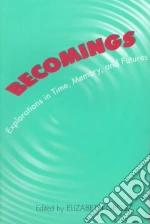 Title :
Becomings
Title :
BecomingsAuthor: Grosz Elizabeth (EDT) Publisher: Cornell Univ Pr With the advent of the new millennium, the notion of the future, and of time in general, has taken on greater significance in postmodern thought. Although the equally pervasive and abstract concept of space has generated a vast body of disciplines, time, and the related idea of 'becoming' (transforming, mutating, and metamorphosing) have until now received little theoretical attention. This volume explores the ontological, epistemic, and political implications of rethinking time as a dynamic and irreversible force. Drawing on ideas from the natural sciences, as well as from literature, philosophy, politics, and cultural analyses, its authors seek to stimulate further research in both the sciences and the humanities which highlights the temporal foundations of matter and culture.The first section of the volume, 'The Becoming of the World,' provides a broad introduction to the concepts of time. The second section, 'Knowing and Doing Otherwise,' addresses the forces within cultural and intellectual practices which produce various becomings and new futures. It also analyzes how alternative models of subjectivity and corporeality may be generated through different conceptions of time. 'Global Futures,' the third section, considers the possibilities for the social, political, and cultural transformation of individuals and nations. € 30,00
|
|
|
1995 |
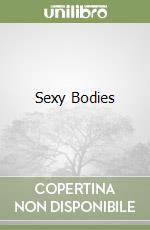 Title :
Sexy Bodies
Title :
Sexy BodiesAuthor: Grosz Elizabeth (EDT), Probyn Elspeth (EDT) Publisher: Routledge € 45,80
|
|
|
1994 |
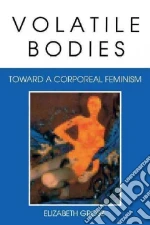 Title :
Volatile Bodies
Title :
Volatile BodiesAuthor: Grosz Elizabeth Publisher: Indiana Univ Pr 'The location of the author's investigations, the body itself rather than the sphere of subjective representations of self and of function in cultures, is wholly new.... I believe this work will be a landmark in future feminist thinking.' —Alphonso Lingis 'This is a text of rare erudition and intellectual force. It will not only introduce feminists to an enriching set of theoretical perspectives but sets a high critical standard for feminist dialogues on the status of the body.' —Judith Butler Volatile Bodies demonstrates that the sexually specific body is socially constructed: biology or nature is not opposed to or in conflict with culture. Human biology is inherently social and has no pure or natural 'origin' outside of culture. Being the raw material of social and cultural organization, it is 'incomplete' and thus subject to the endless rewriting and social inscription that constitute all sign systems. Examining the theories of Freud, Lacan, Merleau-Ponty, Foucault, Deleuze, Derrida, etc. on the subject of the body, Elizabeth Grosz concludes that the body they theorize is male. These thinkers are not providing an account of 'human' corporeality but of male corporeality. Grosz then turns to corporeal experiences unique to women—menstruation, pregnancy, childbirth, lactation, menopause. Her examination of female experience lays the groundwork for developing theories of sexed corporeality rather than merely rectifying flawed models of male theorists. € 20,30
|
|
|
1990 |
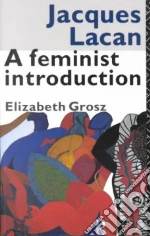 Title :
Jacques Lacan
Title :
Jacques LacanAuthor: Grosz Elizabeth Publisher: Routledge Grosz gives a critical overview of Lacan's work from a feminist perspective. Discussing previous attempts to give a feminist reading of his work, she argues for women's autonomy based on an indifference to the Lacanian phallus. € 47,30
|